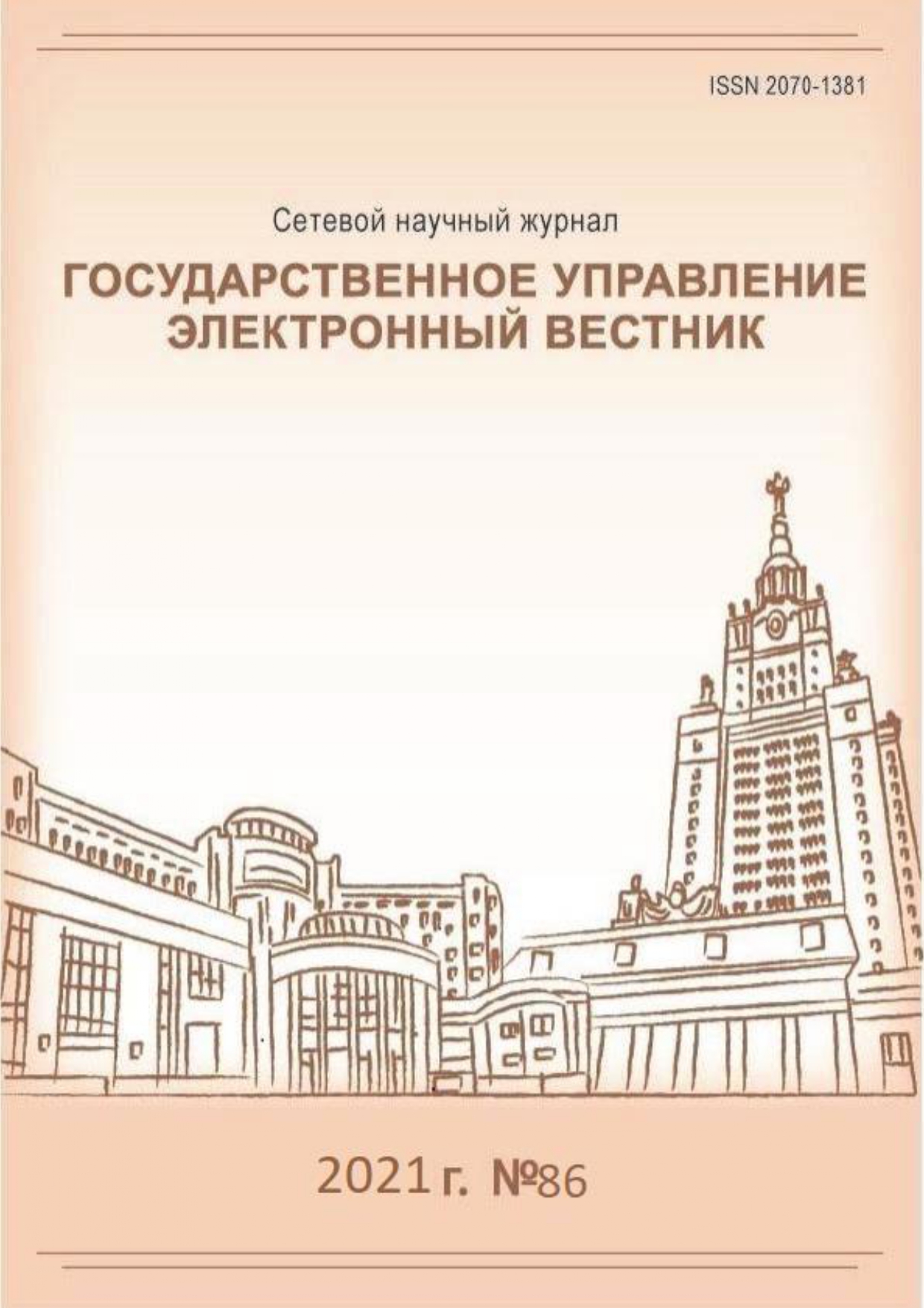Openness of State Data in the Field of Implementing Priority Directions of National Policy in the Subjects of the Russian Federation
Keywords:
National policy, data openness, interethnic relations, monitoring, ethnopolitical conflict, radicalismAbstract
The article examines the issue of openness of constituent entities of the Russian Federation on the state of interethnic relations and ongoing activities aimed at maintaining interethnic peace and harmony, as well as the current situation in the field of ethnopolitics and interethnic conflicts within the country. Open, accessible and public information on the activities of federal executive bodies, as well as regional bodies at a local level, is an important tool for preventing interethnic tensions and reducing turbulence in domestic politics in the face of political, economic and epidemiological challenges for the country. In addition, open information about the state of national policy remains relevant for the long-term formation of a stable statehood with multiconfessional and multi-ethnic ties, and also allows directing the resources of the civil society that receives the institutional framework to search for new measures and ways to prevent ethnopolitical crises and internal radicalization of certain ethno-confessional groups and communities. To determine openness, standard research methods were used, as well as sociological surveys and content analysis. Based on the results of the study, the author comes to the conclusion that at the regional level there is a critically low degree of data openness in the field of interethnic relations. Poor awareness of the population about the measures taken by the authorities to implement the priority directions of the state national policy forms a negative public background and hinders the increase in the efficiency of state authorities. In addition, based on the methods of media content analysis, expert reports, opinion polls and digital data collection, the existing opportunities and limitations of the existing state information system «Monitoring in the field of interethnic and interfaith relations and early warning of conflict situations» were identified.
References
Дарменова А.С., Мамыкова Ж.Д., Андерсен К. Открытые данные: двадцатипятилетняя история развития // Вестник НГУЭУ. 2020. № 2. C. 183–197. DOI: https://doi.org/10.34020/2073-6495-2020-2-183-197
Деревянченко Ю.И. Нормативно-правовые основы системы мониторинга межнациональных и межконфессиональных отношений // Вестник Сибирского института бизнеса и информационных технологий. 2018. № 4(28). С. 62–67.
Зорин В.Ю., Абрамов А.В. Государственная национальная политика, консолидация общества и политическая наука в современной России // Вестник Московского государственного областного университета (электронный журнал). 2018. № 1. DOI: 10.18384/2224-0209-2018-1-861.
Тишков В.А. Концептуальная динамика этнополитики в России (от Горбачева до Путина) // Вестник российской нации. 2018. № 6. C. 9–30.
Толкунов Н.С. Феномен национализма в полиэтничной среде // Вестник Саратовского университета. 2020. Т. 20. № 2. С. 224–227. DOI: https://doi.org/10.18500/1818-9601-2020- 20-2-224-227.
Gasco M. Living Labs: Implementing Open Innovation in the Public Sector // Government Information Quarterly. 2017. Vol. 34. Is. 1. P. 90–98. DOI: https://doi.org/10.1016/j.giq.2016.09.003.
Kiyamov I.K., Sabitov L.S, Kabirova G.I., Shakhtyamova L.Sh. Iskhakova L.Sh. Actual Issues of Digital Transformation of the Russian Economy in Modern Conditions // IOP Conf. Series: Materials Science and Engineering. 2019. DOI: https://doi.org/10.1088/1757- 899X/570/1/012056.
Piotrowski S. The «Open Government Reform» Movement: The Case of the Open Government Partnership and US Transparency Policies // American Review of Public Administration. 2017. Vol. 47. Is. 2. P. 155–171. DOI: https://doi.org/10.1177/0275074016676575.
Ruijer E., Grimmelikhuijsen S., Meijer A. Open Data for Democracy: Developing a Theoretical Framework for Open Data Use // Government Information Quarterly. 2017. Vol. 34. Is. 1. P. 45–52. DOI: https://doi.org/10.1016/j.giq.2017.01.001.
Sieber R.E., Johnson P. Civic Open Data at a Crossroads: Dominant Models and Current Challenges // Government Information Quarterly. 2015. Vol. 32. Is. 3. P. 308–315. DOI: https://doi.org/10.1016/j.giq.2015.05.003.
Downloads
Published
Similar Articles
- Aleksandr O. Naumov, Yuriy Yu. Petrunin, Aleksandr A. Sagomonyan, Khrushchev — Franco — 1:1 (on the Football Fields of the Cold War) , Public Administration. E-journal (Russia): No. 108 (2025)
- Maxim A. Budanov, Alexander Yu. Polunov, Fundamentals of the Strategy of the State National Policy of the Russian Federation and Improving the Conceptual Framework for Regulating Interethnic Relations , Public Administration. E-journal (Russia): No. 104 (2024)
- Natalya I. Kharitonova, Alexey S. Maksimov, Russia’s Interaction with Key Geopolitical Opponents in Hybrid War: An Integrated Strategic Approach , Public Administration. E-journal (Russia): No. 95 (2022)
- Dmitriy M. Pogorelskiy, Civilizational dimension of Russia's ethnopolitical security , Public Administration. E-journal (Russia): No. 104 (2024)
- Shamkhan T. Isaev, Ingush and Ossetian Peoples as a Part of Russian and Soviet States (18th–First Half of 20th century): To the Prehistory of 1992 Conflict , Public Administration. E-journal (Russia): No. 92 (2022)
- Dmitry. А. Vasilyev, State Tariff and Antimonopoly Regulation of the Electric Power Complex: Institutional Aspect , Public Administration. E-journal (Russia): No. 97 (2023)
- Li Minhan, Tools for Stimulating Development of Cross-Border Online Business in the Interests of Strengthening the EAEU and BRICS Integration , Public Administration. E-journal (Russia): No. 110 (2025)
- Olga V. Kudryavtseva, Sergey V. Vasiliev, Implementation of the Sustainable Development Goal in the Field of Waste Management in Russia through National Projects , Public Administration. E-journal (Russia): No. 109 (2025)
- Tatiana N. Yudina, Anna V. Bogomolova, Olga V. Petuhova, Arkady P. Vainshtok, Support for Families with Children as a Direction of Social Policy and Task of Strategic Management: Experience and Problems of Forming an Information Resource for Analysing the Situation of Families with Children in Russian Federation Regions , Public Administration. E-journal (Russia): No. 88 (2021)
- Valery N. Minat, Ethnocultural Polarization of Government Personnel and the Choice of Public Administration Model (Using the Example of the Southwestern United States) , Public Administration. E-journal (Russia): No. 102 (2024)
You may also start an advanced similarity search for this article.




